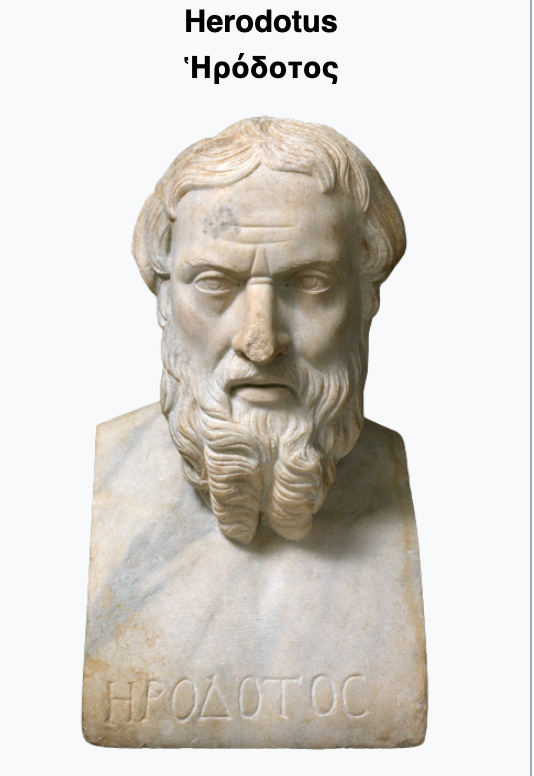Herodotus was a Greek historian who lived in a town called Halicarnassus (now called Bodrum, in Turkey) in the fifth century BCE.
Halicarnassus was a Greek speaking city under the rule of the Persians, and it remained loyal to the Persians all the way up to the Macedonian invasion.
The Great war between the Persian and the Greeks was very recent history for his generation. Herodotus himself was born five years after the battle of Marathon and five years before the battle of Salamis. His account of that war is the most accurate and detailed account that we have.
Cicero named Herodotus “The father of historians” and the name has stuck ever since. His unique folksy style, his lively curiosity about other peoples and races, and his position straddling 2 major cultural worlds, the Greek and the Persian, together with his very non-judgmental approach towards all races and countries make him a rather unique figure.
He understood, to a degree exceptional for his time, that he was living in a globalized era. No one before him seems ever to have had the idea of writing such a panoramic, sweeping view of world history. He gives us a view of what the world was like in the 5th century, and he does so with a truly international perspective.
Indeed, no one before him and few after him shared his total lack of prejudice of foreign cultures. So balanced was his treatment of the different races that Plutarch gave him the nickname of “Philo-barbaros” or “Barbarian-lover”.
“If one were to order all mankind to choose the best set of rules in the world, each group would, after due consideration, choose its own customs; each group regards its own as being the best by far," he observed.
Apart from the war between the Greeks and the Persians, we are also indebted to him for his accounts of Egypt. Some of his observations are truly amazing: for example, he records the first ever circumnavigation of Africa under the reign of King Necho (around 600 BCE). This voyage preceded Vasco da Gama’s trip by around 2,000 years!
He makes the following interesting remark concerning the trip: (for “Libya” read “Africa” - Libya was how the ancient Greeks referred to the entire continent):
“These men made a statement which I do not myself believe, though others may, to the effect that as they sailed on a westerly course round the southern end of Libya, they had the sun on their right - to northward of them.”
Herodotus is believed to have died in Athens of the same plague that killed Pericles.
He lived to see the start of the Peloponnesian war, the same war that took Athens from the peak of its prosperity to its total devastation.




In primary school, we had history as a part of social science and not the individual subject and still there were many references of Greek historians and philosophers.
In primary school, we had history as a part of social science and not the individual subject and still there were many references of Greek historians and philosophers.